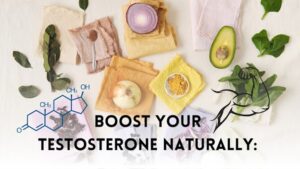
The Power of Food, Lifestyle, and Smart Habits
Testosterone isn’t just a hormone for bodybuilders or alpha males—it’s a vital part of every man’s health (and yes, women have it too, in smaller amounts!). It regulates energy, muscle mass, mood, libido, and even mental sharpness. But here’s the catch: testosterone levels can dip due to age, stress, poor diet, or lack of sleep. The good news? You can take control and boost it naturally. In this guide, I’m diving deep into how eating the right foods, paired with some clever lifestyle tweaks, can rev up your testosterone levels. Let’s get started.
Why Testosterone Matters?
Before we jump into the “how,” let’s talk about the “why.” Low testosterone can leave you feeling sluggish, irritable, and less motivated. It can zap your strength, tank your sex drive, and even make it harder to focus. On the flip side, healthy testosterone levels keep you energized, confident, and strong. So, whether you’re 25 or 55, optimizing this hormone is worth the effort.
The Food Connection: Eat Your Way to Higher Testosterone
Your diet is the foundation of testosterone production. What you put on your plate either fuels your hormone factory or shuts it down. Here’s a breakdown of the best foods to eat—and why they work.
1. Eggs – The Testosterone Powerhouse
Eggs are nature’s multivitamin. The yolk is loaded with cholesterol (the good kind!), which your body uses as a building block for testosterone. Plus, eggs pack protein, vitamin D, and healthy fats—all critical for hormone health. How to eat them: Scramble 2-3 eggs with spinach for breakfast, or hard-boil a batch for a quick snack. Aim for organic or pasture-raised eggs for maximum nutrient density.
2. Fatty Fish – Omega-3s for the Win
Salmon, mackerel, and sardines are rich in omega-3 fatty acids, which reduce inflammation and support testosterone synthesis. They’re also high in vitamin D, a nutrient directly linked to higher T-levels.
How to eat it: Grill a salmon fillet with lemon and garlic twice a week, or toss sardines into a salad for a quick boost.
3. Red Meat –Zinc and Saturated Fat
Beef, especially lean cuts like sirloin or grass-fed ribeye, delivers zinc and saturated fats—two essentials for testosterone production. Zinc deficiency is a common culprit behind low T, and red meat is one of the best ways to fix that.
How to eat it: Cook a 6-ounce steak with roasted veggies once or twice a week. Don’t overdo it—balance is key.
4. Nuts –Healthy Fats and Magnesium
Almonds, walnuts, and Brazil nuts are packed with monounsaturated fats and magnesium, both of which support testosterone. Brazil nuts also contain selenium, a trace mineral tied to hormone balance.
How to eat them: Grab a handful (about 1 ounce) as a snack, or sprinkle them over oatmeal. Limit to 2-3 Brazil nuts daily to avoid selenium overload.
5. Leafy Greens– Magnesium and Nitrate Boost
Spinach, kale, and Swiss chard are loaded with magnesium, which studies show can increase free testosterone levels. They also improve blood flow, which indirectly supports hormone delivery.
How to eat them: Sauté spinach with garlic as a side dish, or blend kale into a morning smoothie with berries and protein powder.
6. Avocado – The Fat Bomb
Avocados are a goldmine of healthy fats and vitamin E, which protect testosterone-producing cells from oxidative stress. They’re also versatile and delicious.
How to eat it: Mash half an avocado on whole-grain toast, or add slices to your steak salad.
7. Oysters –Zinc Overload
Oysters are the king of zinc-rich foods. Just six oysters give you over 300% of your daily zinc needs, making them a testosterone superfood.
How to eat them: Enjoy them raw with a squeeze of lemon, or grill them if you’re not into the raw vibe. Once a week is plenty.
Foods to Avoid: Testosterone Killers
Just as some foods boost testosterone, others tank it. Cut back on:
– Processed Carbs: White bread, sugary cereals, and pastries spike insulin, which can suppress T-levels.
– Excess Alcohol: A beer or two is fine, but heavy drinking (especially beer with its estrogen-like hops) can lower testosterone.
– Soy Overload: Too much soy (like tofu or soy milk) might mimic estrogen in the body, throwing off your hormone balance.
Beyond Diet:Lifestyle Tips to Skyrocket Testosterone
Food is only half the equation. These habits will amplify your efforts and keep your testosterone humming.
1. Lift Heavy Weights
Strength training—especially compound lifts like squats, deadlifts, and bench presses—triggers testosterone release. Aim for 3-4 sessions a week, lifting at
70-85% of your max capacity for 5-8 reps. Rest 60-90 seconds between sets to maximize the hormonal response.
2. Sleep Like a Champion
Testosterone production peaks during deep sleep. Skimp on shut-eye, and your levels plummet. Shoot for 7-9 hours per night, and keep a consistent bedtime. Pro tip: Avoid screens an hour before bed—blue light messes with melatonin and sleep quality.
3. Manage Stress
Chronic stress floods your body with cortisol, a hormone that competes with testosterone. Meditation, deep breathing, or even a 10-minute walk can dial down cortisol. Find what works for you and make it a daily habit.
4. Get Some Sun
Vitamin D isn’t just in fish—it’s free from sunlight too. Expose your skin to 15-20 minutes of direct sun daily (depending on your skin tone and location) to boost
D levels and, in turn, testosterone.
5. Stay Lean
Excess body fat converts testosterone into estrogen via an enzyme called aromatase. Keep your body fat in check with a mix of diet and exercise—aim for 10-20% for optimal hormone balance.
RDA: Recommended Daily allowances of minerals which are helpful in testosterone production.
● Vitamin D3: Aim for 600-800 IU per day.
● Zinc: Target 15-30 mg daily, especially if you’re active or eat less meat (RDA is 11 mg for men). This mineral fuels testosterone synthesis and offsets losses from sweat.
● Magnesium: Get 200-400 mg each night (RDA is 400-420 mg for men) to enhance sleep quality and free testosterone levels. It’s a game-changer forrecovery.
● Ashwagandha: Take 500-600 mg daily of this adaptogenic herb (no official RDA, but studies back this range). It lowers stress and boosts testosterone naturally.
Want more tips? Watch this video we made on testosterone for a deeper dive:
https://www.youtube.com/shorts/YfJwK_Cv7Tw
https://www.youtube.com/shorts/4tkmLJjYMgUhttps://www.instagram.com/reel/DHD3oXhtr3x/?igsh=MXFhNGhubmhxc3E5aQ==
Final Thoughts
Boosting testosterone isn’t about quick fixes—it’s a lifestyle. Start with small changes: swap junk food for nutrient-dense meals, prioritize sleep, and move your body. Over time, you’ll feel the difference—more energy, better moods, and a stronger you. Ready to take charge? Your hormones are waiting.
Blog By dramitharshana



